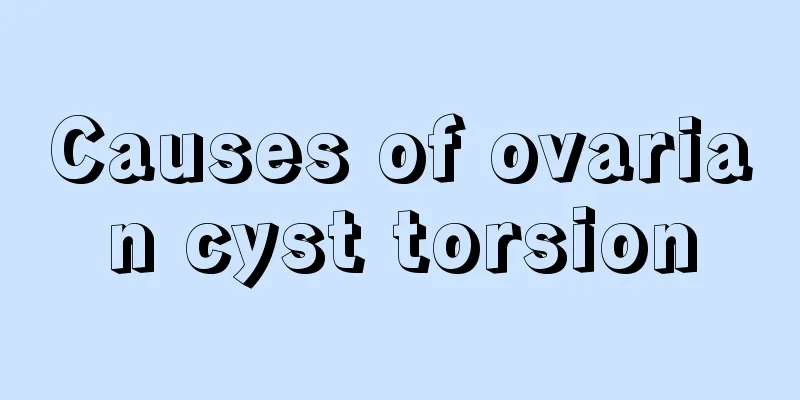[Medical Q&A] Can probiotics “stop diarrhea”?
![[Medical Q&A] Can probiotics “stop diarrhea”?](/upload/images/67eff822c49d5.webp)
|
Planner: Chinese Medical Association Reviewer: Niu Chao, deputy chief physician, Children's Hospital Affiliated to Chongqing Medical University The causes of baby diarrhea are more complicated, mainly including infectious and non-infectious factors. Infectious diarrhea is mostly caused by viruses (such as rotavirus, norovirus), bacteria (such as Escherichia coli, Salmonella), etc.; non-infectious diarrhea may be caused by improper feeding (such as eating too much, too fast), complications caused by diseases such as pneumonia, adverse reactions caused by antibiotics (such as azithromycin), food allergies or abdominal cold. Probiotics are a type of active microorganisms that are beneficial to the host. They mainly live in the human intestines and exert a variety of health benefits by regulating the balance of intestinal flora. In the case of diarrhea in babies, the flora in the intestines is often in a disordered state, the number of beneficial bacteria decreases, and harmful bacteria may multiply in large numbers. After probiotics enter the intestines, they can increase the number of beneficial bacteria and inhibit the growth and reproduction of harmful bacteria, thereby improving the intestinal microecological environment. In addition, probiotics can promote the repair of intestinal mucosa, enhance intestinal immunity, and help the intestines restore normal digestion and absorption functions. Probiotics have a certain effect on baby diarrhea, but it cannot be generalized that they can "stop diarrhea". For non-infectious diarrhea, especially diarrhea caused by intestinal flora imbalance, such as diarrhea caused by the use of antibiotics, the effect of probiotics is usually more obvious, and can effectively help restore intestinal flora and alleviate diarrhea symptoms. However, for infectious diarrhea, such as diarrhea caused by rotavirus infection, probiotics mainly play an auxiliary therapeutic role and cannot replace anti-infective drugs. Moreover, different types of probiotics have different effects on different babies. Some babies have significant effects after taking them, while others are not so obvious. If your baby has diarrhea, parents should first take the baby to see a doctor to find out the cause of the diarrhea. When using probiotics under the doctor's advice, pay attention to the storage and administration methods. Probiotics generally need to be refrigerated and should be taken with warm water not exceeding 40°C to avoid destroying their activity. At the same time, do not take them at the same time as antibiotics. It is best to take them 2 to 3 hours apart, because antibiotics will kill probiotics while killing harmful bacteria. In addition, control the dosage and course of treatment according to the doctor's advice, and do not increase or decrease them on your own. |
<<: [Medical Q&A] Neonatal jaundice: Can jaundice be reduced by sun exposure?
>>: [Medical Q&A] Is roseola infantum really as simple as “a rash appears when the fever subsides”?
Recommend
The key to successful IVF
Although most people can achieve conception and c...
What should boys give to girls when they have their period?
By practicing what you have done, let her know in...
What should I do if my uterus does not contract well after childbirth?
The recovery of the uterus after childbirth requi...
What is the reason for the yellowing of the leaves of the bean curd? What should I do if the leaves of the bean curd turn yellow?
Peperomia is very common in life. It is loved by ...
Increased vaginal discharge three months after delivery
Women generally need to stay in bed for about a m...
Itchy blisters on hands during pregnancy
Pregnant women should be very careful about the u...
Female vulva acne pus discharge
The female genitals are the most private and sens...
Feeling of cervix dropping
Women have not given birth and are not pregnant, ...
How is Sanya International Duty Free Shop? Can Sanya Duty Free Shop issue invoices?
Summer is here, and girls love shopping. If you c...
Bad mood leads to breast cancer? Both men and women are no exception
Anger, anxiety, and depression often occur But Do...
How to choose autumn clothes for women
Autumn is a season that is neither too hot nor to...
Treatment of borderline serous ovarian tumors
The ovaries are very important for women. If ther...
What to do if pregnant women are lactose intolerant
It is common for pregnant women to suffer from la...
Picture of cracked opening beside vulva
Vulvar pruritus is a relatively common disease. I...
Why is menstrual period brown?
Under normal circumstances, women's menstrual...









